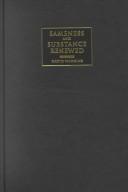| Listing 1 - 10 of 33 | << page >> |
Sort by
|
Book
ISBN: 0631190902 9780631190905 Year: 1980 Publisher: Oxford : Blackwell,
Abstract | Keywords | Export | Availability | Bookmark
 Loading...
Loading...Choose an application
- Reference Manager
- EndNote
- RefWorks (Direct export to RefWorks)

ISBN: 0521456193 0521454115 0511012896 9786610416790 0511052898 1280416793 0511153627 0511174071 0511327978 0511612753 1107112311 9780511012891 9780521454117 9780521456197 0511037651 9780511037658 9780511153624 9780511612756 9781280416798 Year: 2001 Publisher: Cambridge, UK : New York : Cambridge University Press,
Abstract | Keywords | Export | Availability | Bookmark
 Loading...
Loading...Choose an application
- Reference Manager
- EndNote
- RefWorks (Direct export to RefWorks)
In this book, which thoroughly revises and greatly expands his classic work Sameness and Substance (1980), David Wiggins retrieves and refurbishes in the light of twentieth-century logic and logical theory certain conceptions of identity, of substance and of persistence through change that philosophy inherits from its past. In this new version, he vindicates the absoluteness, necessity, determinateness and all or nothing character of identity against rival conceptions. He defends a form of essentialism that he calls individuative essentialism, and then a form of realism that he calls conceptualist realism. In a final chapter he advocates a human being-based conception of the identity and individuation of persons, arguing that any satisfactory account of personal memory must make reference to the life of the rememberer himself. This important book will appeal to a wide range of readers in metaphysics, philosophical logic, and analytic philosophy.
Metaphysics --- Identity (Philosophical concept) --- Individuation (Philosophy) --- Essentialism (Philosophy) --- Conceptualism --- Substance (Philosophy) --- Identité --- Individu (Philosophie) --- Essence (Philosophie) --- Conceptualisme --- Substance (Philosophie) --- Conceptualism. --- Identity. --- Speculative Philosophy --- Philosophy --- Philosophy & Religion --- Identité --- Essence (Philosophy) --- Individuals (Philosophy) --- Individuation --- Particulars (Philosophy) --- Identity --- Matter --- Ontology --- Reality --- Nominalism --- Realism --- Scholasticism --- Universals (Philosophy) --- Haecceity (Philosophy) --- Comparison (Philosophy) --- Resemblance (Philosophy) --- Arts and Humanities
Book
ISBN: 0631140441 9780631140443 Year: 1987 Volume: 6 Publisher: Oxford: Blackwell,
Abstract | Keywords | Export | Availability | Bookmark
 Loading...
Loading...Choose an application
- Reference Manager
- EndNote
- RefWorks (Direct export to RefWorks)
General ethics --- Values --- Axiology --- Worth --- Aesthetics --- Knowledge, Theory of --- Metaphysics --- Psychology --- Ethics --- Values.

ISBN: 0140252886 9780140252880 Year: 2006 Publisher: London: Penguin books,
Abstract | Keywords | Export | Availability | Bookmark
 Loading...
Loading...Choose an application
- Reference Manager
- EndNote
- RefWorks (Direct export to RefWorks)
Almost every thoughtful person wonders at some time why morality says what it says and how, if at all, it speaks to us. David Wiggins surveys the answers most commonly proposed for such questions—and does so in a way that the thinking reader, increasingly perplexed by the everyday problem of moral philosophy, can follow. His work is thus an introduction to ethics that presupposes nothing more than the reader’s willingness to read philosophical proposals closely and literally. Gathering insights from Hume, Kant, the utilitarians, and a twentieth-century assortment of post-utilitarian thinkers, and drawing on sources as diverse as Aristotle, Simone Weil, and Philippa Foot, Wiggins points to the special role of the sentiments of solidarity and reciprocity that human beings will find within themselves. After examining the part such sentiments play in sustaining our ordinary ideas of agency and responsibility, he searches the political sphere for a neo-Aristotelian account of justice that will cohere with such an account of morality. Finally, Wiggins turns to the standing of morality and the question of the objectivity or reality of ethical demands. As the need arises at various points in the book, he pursues a variety of related issues and engages additional thinkers—Plato, C. S. Peirce, Darwin, Schopenhauer, Leibniz, John Rawls, Montaigne and others—always emphasizing the words of the philosophers under discussion, and giving readers the resources to arrive at their own viewpoint of why and how ethics matters.
Ethics --- Moral and ethical aspects --- Philosophy --- Aristotle --- Hume, David, --- Kant, Immanuel, --- General ethics --- Acqui 2006 --- Hume, David, - 1711-1776 --- Kant, Immanuel, - 1724-1804

ISBN: 0198237197 9780198237198 Year: 2002 Publisher: Oxford: Oxford university press,
Abstract | Keywords | Export | Availability | Bookmark
 Loading...
Loading...Choose an application
- Reference Manager
- EndNote
- RefWorks (Direct export to RefWorks)
Values --- Values. --- Algemene ethiek --- Acqui 2006
Book
Year: 1967 Publisher: Oxford : Blackwell,
Abstract | Keywords | Export | Availability | Bookmark
 Loading...
Loading...Choose an application
- Reference Manager
- EndNote
- RefWorks (Direct export to RefWorks)
Book
ISBN: 0631175555 Year: 1991 Publisher: Oxford : Blackwell,
Abstract | Keywords | Export | Availability | Bookmark
 Loading...
Loading...Choose an application
- Reference Manager
- EndNote
- RefWorks (Direct export to RefWorks)
Book
ISBN: 0631103708 Year: 1967 Publisher: Oxford : B. Blackwell,
Abstract | Keywords | Export | Availability | Bookmark
 Loading...
Loading...Choose an application
- Reference Manager
- EndNote
- RefWorks (Direct export to RefWorks)
Identity (Philosophical concept) --- Space and time --- Identité --- Espace et temps --- Aristotle. --- Leibniz, Gottfried Wilhelm,
Book
ISBN: 9780198716624 Year: 2017 Publisher: Oxford Oxford university press
Abstract | Keywords | Export | Availability | Bookmark
 Loading...
Loading...Choose an application
- Reference Manager
- EndNote
- RefWorks (Direct export to RefWorks)
Book
ISBN: 9780198726173 Year: 2022 Publisher: Oxford Oxford university press
Abstract | Keywords | Export | Availability | Bookmark
 Loading...
Loading...Choose an application
- Reference Manager
- EndNote
- RefWorks (Direct export to RefWorks)
| Listing 1 - 10 of 33 | << page >> |
Sort by
|

 Search
Search Feedback
Feedback About UniCat
About UniCat  Help
Help News
News